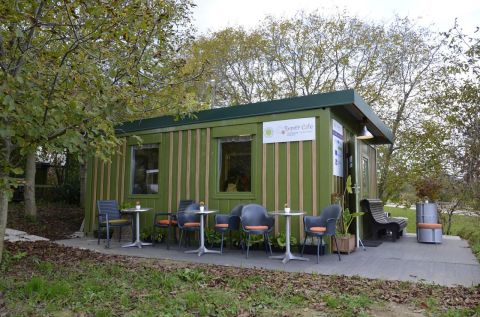
As interest in circular economy governance grows, effective policymaking increasingly depends on the development and continuous monitoring of circular policies that promote sustainable consumption and circular lifestyles. This participatory lab will bring together policymakers, urban practitioners and experts to explore both the political and practical conditions needed to mainstream circular urban lifestyles, as well as the tools and indicators required to track their adoption and impact. Building on these inputs, the lab will host an interactive Knowledge Café where participants can share experiences, discuss challenges and identify best practices.
- Circular economy | Governance and Public administration | Industry, entrepreneurship and SMEs (enterprise/ startup/ business) | INTERREG | Local and regional | Research and Innovation | Sustainable | Urban
- Code: 15IS252110
- Square Brussels, 213-215
Speakers
Moderator
Practical information
- When
-
Wed 15/10/2025, 14:00 - 15:30 CET
- Where
- Square Brussels, 213-215
- Type of partnership
- Partnership
- Format
- Interactive session
- Theme
-
Cities building tomorrow
- Language
- English

Partners

German Environment Agency

Budapest University of Technology and Economics

VITO
Document
Reporting
Session summary
The session explored how cities can make circular economy lifestyles easy and attractive for citizens and by that supporting the sustainable transformation of cities. The NiCE project presented practical experiences from eight European pilot cities, demonstrating how urban centers can be reimagined through circular design and citizen engagement. The City of Turku shared its pathway to climate positivity by 2029, highlighting innovative approaches to measuring both sector-based and consumption-based emissions and aligning investments with EU sustainability goals.
Commentators from Mannheim and Flanders emphasized that lasting transformation requires both behavioural change and effective monitoring. Cities should create enabling environments for citizens, communicate clearly across audiences, and use indicators that reflect not only material flows but also social and cultural shifts.
In group discussions, participants stressed the importance of political commitment, inclusive language, and community-based initiatives such as repair cafés. They agreed that progress towards circular lifestyles depends on systemic reform, collaboration, and the use of meaningful indicators that connect policy ambitions with everyday practices.
Overall Takeaways
- Circular lifestyles require systemic urban change, combining infrastructure, governance, and citizen engagement.
- Monitoring and indicators are key but must evolve to reflect human behavior and social dynamics, not only material flows.
- Behavioural change, inclusive communication, and collaborative experimentation are vital for success.
- Cities can drive transformation by acting as role models, aligning policy tools, and making sustainable choices accessible and attractive.
Quotes
-
By 2040, we’re aiming for fully sustainable use of natural resources and a zero-waste society in Turku. We call this “resource wisdom.”
We see circular economy as a tool that we can use to achieve our four targets : carbon neutrality, waste-free society, smart use of natural resources as well as protecting our environment.
Pilot projects about circular lifestyle offers can revitalise city centres in a sustainable way and pave the way for simplifying access to circular offers for everyone in the long term.
Make it easier for citizens to make the right decision, because competing values, counterproductive incentives, a lack of relevant alternatives, and practical and price barriers stand in the way of choosing the sustainable option.
A genuine transformation towards sustainable lifestyles requires spaces, structures and value-based communication to create a collective sense of responsibility.
Indicators are to feed into the information needs of decision-makers. These can strongly differ: civil servants at the regional policy level have different needs compared to citizens or to companies.
The logics of thinking in terms of fulfilment of societal needs, ultimately expressed in consumption of products and materials – which are to change throughout the CE transition, and ideally these changes are to be measured and monitored.
Additional links
https://www.interreg-central.eu/projects/nice/
https://circular-cities-and-regions.ec.europa.eu/
https://www.vlaanderen-circulair.be/en
https://www.mannheim.de/de/stadt-gestalten/local-green-deal/projekt-colab-2023-2025





